Our Needs
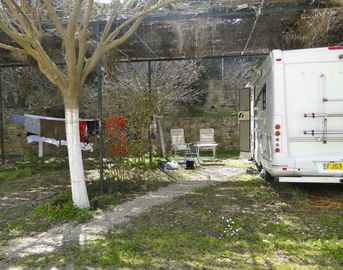
This is "camping", not a "Night Stop".
This could also be labelled “our use of Bessy”. First of all we are touring Europe and not outer Mongolia, so a 4-wheel drive is not essential. But, having been Land Rover users for many years we do miss the opportunity to just nip up a narrow dirt road to see what’s up there.
We don’t have small children with us, nor do we have a dog or canoes or motorbikes. In fact we haven’t even got cycles. Therefore we don’t need heavy carrying brackets or masses of storage.
Our main use is in travelling steadily around the world. We usually drive around 30 or 40 km a day. Naturally we do some real long distance runs as well, for example, when travelling to Greece to escape the winter snows in Northern Europe.
That brings us to the next point; we don’t want to be in cold areas longer than necessary as we don’t have a full double floor and unlimited cash for heating.
Generally we prefer to stop at Aires, Stellplatz or simply Free Parking. We don’t use the expression Wild Camping. To us "camping" implies getting out the awning, the chairs and the BBQ the minute we stop. Most places we are stopping for the night to sleep. For that reason we call them Night Stops.
The following sections are in no particular order and describe what we have found useful, essential or a waste of time and money.
We don’t have small children with us, nor do we have a dog or canoes or motorbikes. In fact we haven’t even got cycles. Therefore we don’t need heavy carrying brackets or masses of storage.
Our main use is in travelling steadily around the world. We usually drive around 30 or 40 km a day. Naturally we do some real long distance runs as well, for example, when travelling to Greece to escape the winter snows in Northern Europe.
That brings us to the next point; we don’t want to be in cold areas longer than necessary as we don’t have a full double floor and unlimited cash for heating.
Generally we prefer to stop at Aires, Stellplatz or simply Free Parking. We don’t use the expression Wild Camping. To us "camping" implies getting out the awning, the chairs and the BBQ the minute we stop. Most places we are stopping for the night to sleep. For that reason we call them Night Stops.
The following sections are in no particular order and describe what we have found useful, essential or a waste of time and money.
Water
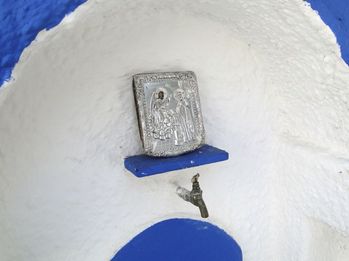
Water outside a Greek church.
Essential for life as we know it. Where do you find it when travelling? The obvious place is a campsite. They often have a central area for water and dumping, but the better ones have tap near the pitch, often shared between two or three pitches.
We have a 100 litre tank for fresh water and with careful use it keeps us going for 4 or 5 days. We once went 10 days without a top up. Taps can often be found at harbours and outside churches in Greece.
TOP TIP. We have a garden hose which is very useful for topping up the water. Some people say you should only use food grade hoses. As far as I can see the water is only in the pipe for a second or so and is unlikely to dissolve any nasty chemicals from the pipe.
We also have a watering can for topping up the tank. Often taps are so designed that we cannot fit a pipe. It really is very useful.
Because the tank is always emptying and filling we rarely use water purifying tablets; generally only when the water may be suspect.
In fact we usually only drink bottled water, the tank water is for cooking and washing. A useful trick for clean drinking water is to keep one clean bottle in the fridge. After boiling water for a coffee we allow the spare water to cool down and that goes in the drinking water bottle.
On top of the 100 litre tank we carry a 10 litre container which we fill with fresh water when we feel we may be unable to find water for a while.
Washing ourselves is not a problem but we do not use the built in shower. It is possible to have a very good wash in just a beaker of water, if we have to! But when on a campsite we make full use of the showers, especially if we don’t have to pay for them. I must point out that we are not scruffy. A clean appearance is essential at borders and when dealing with authorities.
Again, when on a campsite there are usually facilities for dishwashing, but we can manage very nicely on board Bessy.
Bessy has a hot water heating system. It’s a combi-boiler, a bit like at home. But we never use it because it uses up a lot of gas. It’s simpler to boil a kettle for just what you need. On a campsite we can use the provided (paid for) electricity.
The biggest problem regarding water use is laundry. Apart from a quick wash of the smaller items every other day we usually wait until we are on a campsite and use their washing machines. By the way, a 15 meter long nylon rope makes an excellent washing line, strung between trees or from Bessy’s bike rack to a tree. We are adaptable.
We have a 100 litre tank for fresh water and with careful use it keeps us going for 4 or 5 days. We once went 10 days without a top up. Taps can often be found at harbours and outside churches in Greece.
TOP TIP. We have a garden hose which is very useful for topping up the water. Some people say you should only use food grade hoses. As far as I can see the water is only in the pipe for a second or so and is unlikely to dissolve any nasty chemicals from the pipe.
We also have a watering can for topping up the tank. Often taps are so designed that we cannot fit a pipe. It really is very useful.
Because the tank is always emptying and filling we rarely use water purifying tablets; generally only when the water may be suspect.
In fact we usually only drink bottled water, the tank water is for cooking and washing. A useful trick for clean drinking water is to keep one clean bottle in the fridge. After boiling water for a coffee we allow the spare water to cool down and that goes in the drinking water bottle.
On top of the 100 litre tank we carry a 10 litre container which we fill with fresh water when we feel we may be unable to find water for a while.
Washing ourselves is not a problem but we do not use the built in shower. It is possible to have a very good wash in just a beaker of water, if we have to! But when on a campsite we make full use of the showers, especially if we don’t have to pay for them. I must point out that we are not scruffy. A clean appearance is essential at borders and when dealing with authorities.
Again, when on a campsite there are usually facilities for dishwashing, but we can manage very nicely on board Bessy.
Bessy has a hot water heating system. It’s a combi-boiler, a bit like at home. But we never use it because it uses up a lot of gas. It’s simpler to boil a kettle for just what you need. On a campsite we can use the provided (paid for) electricity.
The biggest problem regarding water use is laundry. Apart from a quick wash of the smaller items every other day we usually wait until we are on a campsite and use their washing machines. By the way, a 15 meter long nylon rope makes an excellent washing line, strung between trees or from Bessy’s bike rack to a tree. We are adaptable.
Electricity
This is probably the second most important need in this modern age. We have so many electrically driven items these days, from the kettle to the toothbrush.
We obtain our electricity from a hookup at campsites (or an Aire, Stellplatz, etc.). This charges up the two leisure batteries and the engine battery. In addition there is a solar panel on the roof. It’s more correct to call it a photo-voltaic cell, but it’s harder to spell!
The solar panel does not provide enough power to boil a kettle but it keeps the batteries topped up. As with water, we have gone up to 10 days without visiting a campsite and never had a problem. Don’t forget that when travelling the engine charges the batteries as well.
During this, our first, year we have never had the need for an external generator, nor have we felt the need for an inverter to provide 240 volts from the batteries.
The toothbrush is the only item that needs 240 volts to charge up. All our other electrical goodies can be charged from the ciggy-lighter socket. We have two and they are both in the cab, so when we are motoring along we usually have one of the items on charge.
Our laptop needs (or should it be, takes) 85 watts, which is rather a lot. One evening we were charging it from the engine battery and forgot to unplug it! In the morning we had a flat battery. We now have some power take offs fitted to the leisure batteries.
That is the only electrical inconvenience we have had.
Bessy has lots of lamps which are fitted with halogen bulbs. The light is good and so far we have never felt the need to change them to LED. The batteries seem up to it.
We obtain our electricity from a hookup at campsites (or an Aire, Stellplatz, etc.). This charges up the two leisure batteries and the engine battery. In addition there is a solar panel on the roof. It’s more correct to call it a photo-voltaic cell, but it’s harder to spell!
The solar panel does not provide enough power to boil a kettle but it keeps the batteries topped up. As with water, we have gone up to 10 days without visiting a campsite and never had a problem. Don’t forget that when travelling the engine charges the batteries as well.
During this, our first, year we have never had the need for an external generator, nor have we felt the need for an inverter to provide 240 volts from the batteries.
The toothbrush is the only item that needs 240 volts to charge up. All our other electrical goodies can be charged from the ciggy-lighter socket. We have two and they are both in the cab, so when we are motoring along we usually have one of the items on charge.
Our laptop needs (or should it be, takes) 85 watts, which is rather a lot. One evening we were charging it from the engine battery and forgot to unplug it! In the morning we had a flat battery. We now have some power take offs fitted to the leisure batteries.
That is the only electrical inconvenience we have had.
Bessy has lots of lamps which are fitted with halogen bulbs. The light is good and so far we have never felt the need to change them to LED. The batteries seem up to it.
Communication
Almost as important as electricity these days. Communicating with friends and family can be a problem when travelling. In just the same way, keeping up with the news and current affairs can be problematic. For example, without the internet we would not know that today there was a transport strike in Athens... we might have planned to visit this week.
So how do we keep in touch?
It’s relatively easy in Greece because the internet and wifi can be found all over the country. Campsites have wifi, cafes have wifi, it seems to be everywhere. And it's cable internet. That means we can use Skype for calling people. If they switch their own Skype on we can actually call them for free. Sadly some of our friends and family don’t switch Skype on and we have to call their landline, still using Skype. But that costs money... not a lot, but it’s still money.
The last sentence is a BIG HINT to those who know they are guilty.
Weebly is an amazing website that allows us to make a relatively sophisticated free website of our own. You are reading one of them now. Click on the logo at the bottom of the page and see what it can do for you.
So how do we keep in touch?
It’s relatively easy in Greece because the internet and wifi can be found all over the country. Campsites have wifi, cafes have wifi, it seems to be everywhere. And it's cable internet. That means we can use Skype for calling people. If they switch their own Skype on we can actually call them for free. Sadly some of our friends and family don’t switch Skype on and we have to call their landline, still using Skype. But that costs money... not a lot, but it’s still money.
The last sentence is a BIG HINT to those who know they are guilty.
Weebly is an amazing website that allows us to make a relatively sophisticated free website of our own. You are reading one of them now. Click on the logo at the bottom of the page and see what it can do for you.
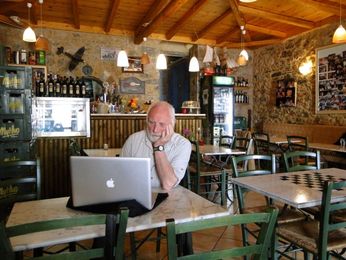
Ian gets up-to-date in Gregg's Plateia in Agios Nikolaos.
Different campsites operate different systems. Some make you pay €3 or €4 a day and after that you can use as much as you like. Others are very mean and charge as much as €10 for 24 hours usage. One near Rome wanted €5 for 2 hours internet!
Some even charge for the old dial-up speed. Camping Finikes, our favourite, includes wifi in the price. Naturally we prefer places like Finikes. We do not stop at those camps charging by the hour.
Greek cafes will often let you sit there all day playing with the internet for the price of a coffee.
Some campsites say they have free wifi but only if you stand outside the reception area. Although the Kamping Fuhrer may think he is helping his guests he is on the slippery slope to losing customers.
Some even charge for the old dial-up speed. Camping Finikes, our favourite, includes wifi in the price. Naturally we prefer places like Finikes. We do not stop at those camps charging by the hour.
Greek cafes will often let you sit there all day playing with the internet for the price of a coffee.
Some campsites say they have free wifi but only if you stand outside the reception area. Although the Kamping Fuhrer may think he is helping his guests he is on the slippery slope to losing customers.
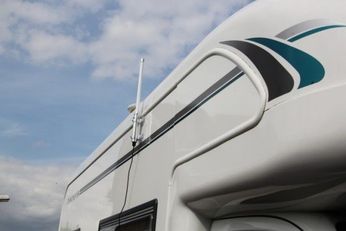
USB Omni-Directional Antenna
To avoid standing outside reception in a rain storm we invested in a USB Omni-Directional Antenna. After the initial setting up problems, because the instructions were written by the same man who invented the video recorder, we find it really helps. In one area with the laptop alone we could receive signals from 4 locations. With the antenna we could see 15 locations. It actually improves the signal as well. Well worth the £69 from http://www.motorhomewifi.com/
To really keep ourselves up top date and reasonably sane we watch TV using http://www.filmon.com. This allows us to watch live UK TV, plus French, German, Asian, movies, etc. If you can get internet there is now no need to spend hundreds, or even thousands, of pounds on a satellite system. Sadly they have recently started charging for the service. After all SKY does not cover Europe East of Vienna.
We also use “Get iPlayer Automator” to download UK TV programmes for viewing later on our Mac.
https://www.macupdate.com/app/mac/39019/get-iplayer-automator
Our mobile phone is usually switched on once or twice a day just in case of emergencies.
When in Hungary for a length of time we have a dongle from Vodafone. We only use it in Hungary because where we stay does not have a good internet connection.
Incidentally, we use Gmail for emailing, but we use it through the Mac Mail program. The Mac interface is much tidier and easier to use.
So you see it is relatively easy and cheap to get TV and to keep in touch.
MiFi is a new option for internet. It's basically a soap block sized box which collects the mobile telephone signal and sends the signal by wifi to upto about 6 computers. Just add a SIM card for the different countries you visit.
Those mean, money-grabbing, thieving, greedy capitalist swines of campsite owners who charge crazy prices for wifi should take note: there is a massive population of motorhomers who list the places they have stayed and the services available on their own websites. We and others always mention the availability of wifi. Basically, the more you charge for an essential item the fewer travellers will visit your campsites. So there!
To really keep ourselves up top date and reasonably sane we watch TV using http://www.filmon.com. This allows us to watch live UK TV, plus French, German, Asian, movies, etc. If you can get internet there is now no need to spend hundreds, or even thousands, of pounds on a satellite system. Sadly they have recently started charging for the service. After all SKY does not cover Europe East of Vienna.
We also use “Get iPlayer Automator” to download UK TV programmes for viewing later on our Mac.
https://www.macupdate.com/app/mac/39019/get-iplayer-automator
Our mobile phone is usually switched on once or twice a day just in case of emergencies.
When in Hungary for a length of time we have a dongle from Vodafone. We only use it in Hungary because where we stay does not have a good internet connection.
Incidentally, we use Gmail for emailing, but we use it through the Mac Mail program. The Mac interface is much tidier and easier to use.
So you see it is relatively easy and cheap to get TV and to keep in touch.
MiFi is a new option for internet. It's basically a soap block sized box which collects the mobile telephone signal and sends the signal by wifi to upto about 6 computers. Just add a SIM card for the different countries you visit.
Those mean, money-grabbing, thieving, greedy capitalist swines of campsite owners who charge crazy prices for wifi should take note: there is a massive population of motorhomers who list the places they have stayed and the services available on their own websites. We and others always mention the availability of wifi. Basically, the more you charge for an essential item the fewer travellers will visit your campsites. So there!
Gas
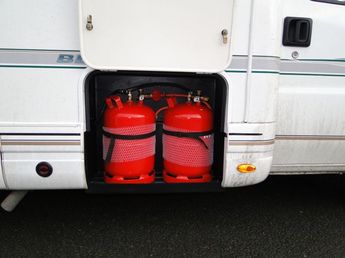
GasIt from Automotive Electrical, Mirfield, Yorkshire.
Soon after we bought Bessy we invested in the GasIt system with 2 large refillable gas bottles. We can top up anywhere that sells LPG. By using LPG we are cutting the cost of gas by around 50%. It is also much simpler than finding a place that will exchange bottles.
The system was bought from Automotive Electrical in Mirfield Yorkshire. Go there because they charge about 50% of what we were quoted for GasLow in Hertfordshire. And they are very nice folks.
The system was bought from Automotive Electrical in Mirfield Yorkshire. Go there because they charge about 50% of what we were quoted for GasLow in Hertfordshire. And they are very nice folks.
Storage
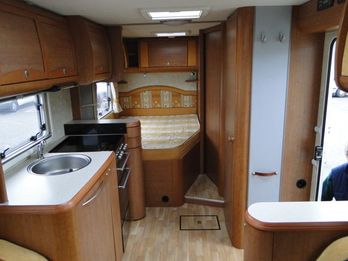
Just a few of the lockers.
For a long-term motorhomer good storage is essential. After all it will be your home for some time. There are things you can do without on a two-week holiday. For a longer period you would miss certain items.
We have 15 top level lockers and one tall hanging cupboard. The big bulky stuff goes under the bed or under the two front side seats. All is accessible from inside or out. Bessy also boasts a kitchen area with three drawers and a tall cupboard, plus a fridge.
The temptation is to fill every nook and cranny. But we have found that we don’t need to carry too much. One outside locker contains wet things, such as hosepipe and watering can (very useful), wet mops and car washing things and another contains oily, greasy things.
We like boxes because they stop things bouncing around and keep the place tidy. In the big lockers we have bigger boxes for emergency food. In the top lockers we have smaller open topped boxes (from IKEA) that contain smaller items. Another tip to help keep the place tidy and rattle free is to line drawers and shelves with non-slip matting. We bought a large sheet from Dunelme Mills and cut it to suit. It’s amazingly good.
We have 15 top level lockers and one tall hanging cupboard. The big bulky stuff goes under the bed or under the two front side seats. All is accessible from inside or out. Bessy also boasts a kitchen area with three drawers and a tall cupboard, plus a fridge.
The temptation is to fill every nook and cranny. But we have found that we don’t need to carry too much. One outside locker contains wet things, such as hosepipe and watering can (very useful), wet mops and car washing things and another contains oily, greasy things.
We like boxes because they stop things bouncing around and keep the place tidy. In the big lockers we have bigger boxes for emergency food. In the top lockers we have smaller open topped boxes (from IKEA) that contain smaller items. Another tip to help keep the place tidy and rattle free is to line drawers and shelves with non-slip matting. We bought a large sheet from Dunelme Mills and cut it to suit. It’s amazingly good.
Weight
Storage leads on to weight and payload. It can appear confusing but hopefully the explanation below may help. There are three things you need to know, but the authorities give them silly long names:
Mass in Running Order (MIRO): the weight of the ‘van as it left the factory, with standard furniture inside, a full fuel tank and a driver weighing 75kg.
Maximum Technically Permissible Laden Mass (MTPLM): the maximum the motorhome can weigh and still be legal to drive. You’ll find this figure on your vehicle’s weight plate, sited under the bonnet or inside a cab door.
Payload is the weight of things you can take with you. in other words MTPLM minus MIRO. That includes, gas cylinders, bikes, solar panels, towbars, clothing, food, drinks.
We took Bessy to a weighbridge a couple of times and found that we could carry 250 kg of payload. People have told us that a vehicle of 7.5 meters should have a payload of 600 kg. Well, we seem to do OK, but we are not like some people who need to carry 3 satellite dishes, a tent, a 36 inch TV, 3 canoes, a motorbike and two cycles plus fairy lights in case they are away for Christmas. We have also seen people with plastic grass and a fence around their motorhome, plus a garden statue of Apollo about 2 meters tall!
Mass in Running Order (MIRO): the weight of the ‘van as it left the factory, with standard furniture inside, a full fuel tank and a driver weighing 75kg.
Maximum Technically Permissible Laden Mass (MTPLM): the maximum the motorhome can weigh and still be legal to drive. You’ll find this figure on your vehicle’s weight plate, sited under the bonnet or inside a cab door.
Payload is the weight of things you can take with you. in other words MTPLM minus MIRO. That includes, gas cylinders, bikes, solar panels, towbars, clothing, food, drinks.
We took Bessy to a weighbridge a couple of times and found that we could carry 250 kg of payload. People have told us that a vehicle of 7.5 meters should have a payload of 600 kg. Well, we seem to do OK, but we are not like some people who need to carry 3 satellite dishes, a tent, a 36 inch TV, 3 canoes, a motorbike and two cycles plus fairy lights in case they are away for Christmas. We have also seen people with plastic grass and a fence around their motorhome, plus a garden statue of Apollo about 2 meters tall!
Dimensions
There is a section on this website with Bessy’s vital statistics. But in brief, she is a bit on the bulky side. Luckily she does not have a bump on top which means she can get into campsites without scraping under too many trees and she does not appear suffer from wind... side winds of course.
But Bessy’s size makes her very comfortable. We can step past each other for example. Most people who have seen inside consider her a good design. One of our new friends has actually bought one after seeing Bessy, rather than splash out on a brand new one.
But Bessy’s size makes her very comfortable. We can step past each other for example. Most people who have seen inside consider her a good design. One of our new friends has actually bought one after seeing Bessy, rather than splash out on a brand new one.
Sleeping
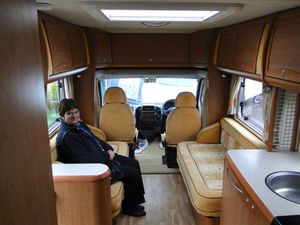
Long side seats on the day we bought Bessy.
Another of life’s essentials. Bessy has a fixed bed at the rear. After throwing the old mattress out and installing a simple foam one we are very comfortable.
The long side seats can be made to meet in the middle and make another double bed. So far we’ve not tried it. But they are comfortable enough as singles for an afternoon lounge/nap.
The long side seats can be made to meet in the middle and make another double bed. So far we’ve not tried it. But they are comfortable enough as singles for an afternoon lounge/nap.
Heating
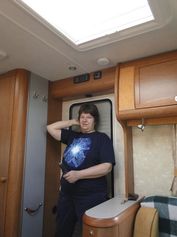
Novel hairdrier from over-door vent.
On a campsite we can use an electric fan heater. Some people use a convector heater. Very convenient and effective.
However, when away from an electrical supply we can use the heating part of the gas combi-boiler. It is very effective, but does use up the gas fairly quickly. The vent above the door makes an excellent hair drier. This is worth noting because an electric hair drier is likely to trip the “fuses” at most campsites. This can be the minor irritation of going outside and flicking the switch back on to having to go to reception and paying for the man to come an unlock the power cupboard. And if he is not there you have no electricity at all. Take note hairdryer users!
However, when away from an electrical supply we can use the heating part of the gas combi-boiler. It is very effective, but does use up the gas fairly quickly. The vent above the door makes an excellent hair drier. This is worth noting because an electric hair drier is likely to trip the “fuses” at most campsites. This can be the minor irritation of going outside and flicking the switch back on to having to go to reception and paying for the man to come an unlock the power cupboard. And if he is not there you have no electricity at all. Take note hairdryer users!
Seating
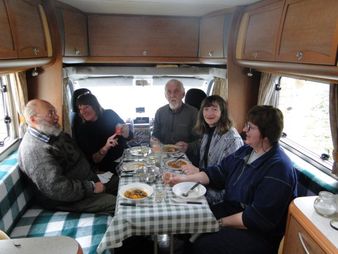
Lots of room for dinner with good friends.
We have two long bench seats each side of Bessy. In addition the driver and passenger seats swivel round to face inwards. We’ve wined and dined with as many as eight people around the table. But we do admit that four is more comfortable.
The table is not fixed. The legs fold up and it stores in our tall cupboard. That leaves acres of space for moving around. We like the non-fixed table, especially after struggling to get around and under other motorhome’s fixed tables.
We also carry two folding upright chairs for sitting around a small table we carry for outside use. For lounging outside we have two long relaxing sun loungers.
This combination seems to work well.
The table is not fixed. The legs fold up and it stores in our tall cupboard. That leaves acres of space for moving around. We like the non-fixed table, especially after struggling to get around and under other motorhome’s fixed tables.
We also carry two folding upright chairs for sitting around a small table we carry for outside use. For lounging outside we have two long relaxing sun loungers.
This combination seems to work well.
Awning
Whoever invented the awning was a clever chap... and then people started adding things to it. Our awning is quite basic and has clearly been well used. In fact it doesn’t close 100%. The last few millimeters don’t want to know, but what the heck.
The add-on that came with the motorhome was a porch or safari room. Call it what you like, it fixes to the open awning making walls around three sides. It’s probably very good, but it weighs a ton. The whole lot was packed in a bag the size of a cricket teams bag. It would have taken all our payload and almost all our storage space.
It now resides in the garage at home.
The add-on that came with the motorhome was a porch or safari room. Call it what you like, it fixes to the open awning making walls around three sides. It’s probably very good, but it weighs a ton. The whole lot was packed in a bag the size of a cricket teams bag. It would have taken all our payload and almost all our storage space.
It now resides in the garage at home.
Dumping
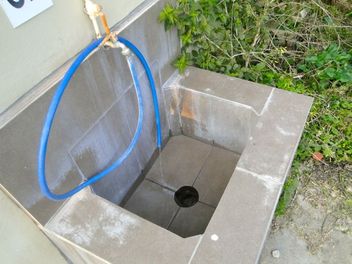
Not nice but someone has to do it. The dump.
Just like home, we have to do something with the rubbish. We re-use plastic shopping bags in every way possible. In this case they are rubbish bags that hang on a hook by the door. When full we trudge off to the dustbins around campsites. While on the road there are always bins around for dumping the full bag.
Next is the smelly job of dumping the grey water. This is the stuff that goes down the sink and can be amazingly pongy. Some campsites are happy for you to throw the grey water under the trees; it waters them. Other places have special dumping points. That can mean driving over a grate and turning the tap or it can mean several trips with a bucket.
We hear of some who just open the tap on a quiet country road and let it run out. We are not clear on the ecological factors around this. After all, it is water with detergent.
It seems that different countries have different views on this.
Now the unsavoury job... the toilet cassette. Somebody has to do it and it’s usually Ian.
In fact it’s not that bad a job. Provided the cassette had the measured amount of Loo Blue in it the contents just swish away down the campsite dumping point. No pong at all. Give it a rinse with the ever present tap and another slug of Loo Blue.
We use the cheapest toilet paper that dissolves so we don't bung up any pipes..
If on a campsite use the toilets for big jobs and reserve the motorhome toilet for emergency widdles.
Next is the smelly job of dumping the grey water. This is the stuff that goes down the sink and can be amazingly pongy. Some campsites are happy for you to throw the grey water under the trees; it waters them. Other places have special dumping points. That can mean driving over a grate and turning the tap or it can mean several trips with a bucket.
We hear of some who just open the tap on a quiet country road and let it run out. We are not clear on the ecological factors around this. After all, it is water with detergent.
It seems that different countries have different views on this.
Now the unsavoury job... the toilet cassette. Somebody has to do it and it’s usually Ian.
In fact it’s not that bad a job. Provided the cassette had the measured amount of Loo Blue in it the contents just swish away down the campsite dumping point. No pong at all. Give it a rinse with the ever present tap and another slug of Loo Blue.
We use the cheapest toilet paper that dissolves so we don't bung up any pipes..
If on a campsite use the toilets for big jobs and reserve the motorhome toilet for emergency widdles.
Parking
Bessy is a big girl and parking can be fun. If she was a bus you would never think of going into certain situations. Because she is nearer the size of a “white van” it is tempting to enter tight car parks, go through old world Greek villages and so on.
In reality she is not too difficult to park but you have to look out for overhanging trees and balconies.
Parking in a campsite often demands several wiggles to get around the corners and then there is the problem of being level. It’s nice to be level. After all, do you want to sleep in a sloping bed? Why is the plug hole in the sink up hill from the water? If the bottom of the sink was concave water would always run down the hole.
But with a bit of wiggling it’s usually possible to get within a degree or two. For those who can’t get level, camping shops sell chocks or ramps. We bought the wrong sort last year and spent a whole year without. Yes, without chocks and without problems. But we will either make our own from bits of plank or buy some big yellow plastic ones.
Incidentally, some people are obsessed with chocks. They store them in special bags and carry two types. One German motorhome in Greece had all four wheels on chocks. Explain that one.
In reality she is not too difficult to park but you have to look out for overhanging trees and balconies.
Parking in a campsite often demands several wiggles to get around the corners and then there is the problem of being level. It’s nice to be level. After all, do you want to sleep in a sloping bed? Why is the plug hole in the sink up hill from the water? If the bottom of the sink was concave water would always run down the hole.
But with a bit of wiggling it’s usually possible to get within a degree or two. For those who can’t get level, camping shops sell chocks or ramps. We bought the wrong sort last year and spent a whole year without. Yes, without chocks and without problems. But we will either make our own from bits of plank or buy some big yellow plastic ones.
Incidentally, some people are obsessed with chocks. They store them in special bags and carry two types. One German motorhome in Greece had all four wheels on chocks. Explain that one.
Security
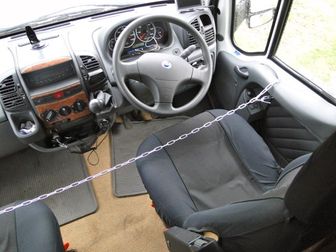
A simple chain may deter an amateur thief.
It’s really like being at home; use common sense. Don’t flaunt your wealth; keep valuables out of sight. Fit an alarm. But what’s the point when the thief has gone. Park in sensible places and if your instinct tells you something is wrong just move on.
Always lock all the doors... not forgetting the cab. To hinder the casual thief we fit a chain across between the two front doors. If he smashes the side windows he still can’t open the doors by which time we should have heard him.
We prefer to park in a well illuminated place with other motorhomers nearby if possible, and try to look poor!
Always lock all the doors... not forgetting the cab. To hinder the casual thief we fit a chain across between the two front doors. If he smashes the side windows he still can’t open the doors by which time we should have heard him.
We prefer to park in a well illuminated place with other motorhomers nearby if possible, and try to look poor!
Driving
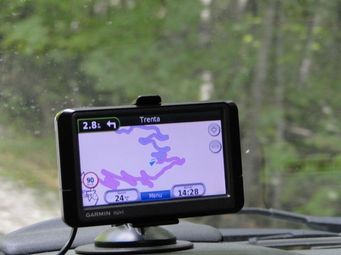
Garmin also warns of conditions ahead.
Bessy is very well behaved. The 2.8 liter diesel engine pulls well. Fifth gear is very high and we only use it if we are on the flat above 50 mph. The handicaps are the length and width. You must constantly be aware of those two dimensions. Luckily she is fitted with two excellent door mirrors.
Bessy is also Right Hand Drive... not Wrong Hand Drive. We’ve lived abroad for over 20 years and have driven RHD and LHD. We’ve never had a problem.
In fact if you are brought up on RHD it could be better to stay that way because you instinctively know where various parts of the motorhome are. Your spatial awareness is not confused by suddenly finding yourself on the wrong side of the vehicle.
There is one problem with the Fiat cab; every surface is curved in 3 dimensions. It’s not possible to rest a book on the dashboard and it’s difficult to fix a SatNav to it.
The SatNav we use is a Garmin 255W Nuvi. We find it easy to use and generally accurate. The problems arise because of the map supplied to Garmin, not the Garmin itself. For example in Germany the Garmin would warn of a turning about 500 yards before the turn. That could easily lead to turning too soon. In Greece we have driven on ancient roads that were not on the Garmin, yet every street in a campsite was displayed.
Overall we are happy with the Garmin but the “Navigator/bomb aimer” always follows us on a map.
How some people get into the difficulties they do amazes us. Use the SatNav as a guide.
Bessy is also Right Hand Drive... not Wrong Hand Drive. We’ve lived abroad for over 20 years and have driven RHD and LHD. We’ve never had a problem.
In fact if you are brought up on RHD it could be better to stay that way because you instinctively know where various parts of the motorhome are. Your spatial awareness is not confused by suddenly finding yourself on the wrong side of the vehicle.
There is one problem with the Fiat cab; every surface is curved in 3 dimensions. It’s not possible to rest a book on the dashboard and it’s difficult to fix a SatNav to it.
The SatNav we use is a Garmin 255W Nuvi. We find it easy to use and generally accurate. The problems arise because of the map supplied to Garmin, not the Garmin itself. For example in Germany the Garmin would warn of a turning about 500 yards before the turn. That could easily lead to turning too soon. In Greece we have driven on ancient roads that were not on the Garmin, yet every street in a campsite was displayed.
Overall we are happy with the Garmin but the “Navigator/bomb aimer” always follows us on a map.
How some people get into the difficulties they do amazes us. Use the SatNav as a guide.
Cooking
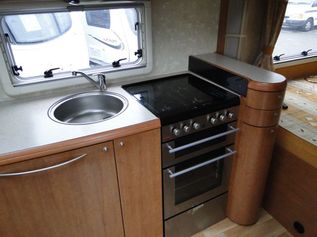
Just like home, so treat it like home.
We seem to be fortunate with our kitchen because it has a full cooker with oven and grill. Three of the burners are gas and one is electric for use on an electric hookup. This means we can cook whatever we want. We see no need to have special “motorhome friendly recipes”; whatever they are.
We have seen several German motorhomes with only a three burner hob... what do they eat?
We have added a page of recipes that we have actually cooked and eaten. Check it out.
We have seen several German motorhomes with only a three burner hob... what do they eat?
We have added a page of recipes that we have actually cooked and eaten. Check it out.
Eating
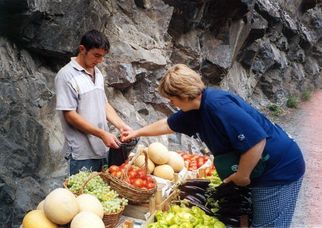
Who needs a freezer with goods as fresh as this!
Our fridge is rather small but so far it has never bothered us because we buy food locally when we need it. We read recently on one of the internet forums someone asking for advice about a trip they were making to France. The question was, should they be worried about their frozen food when crossing the channel; would it survive the crossing. Well, the answer is yes it would survive with the fridge having no electricity for 90 minutes. But it raises a bigger question about what they eat and what they expect to find “abroad”. People manage to survive on the food available on the continent.
To us, one of the pleasures of travelling is discovering new foods and in 99.99% of cases we enjoy it.
To us, one of the pleasures of travelling is discovering new foods and in 99.99% of cases we enjoy it.
USING ATMs ABROAD
Don't say yes to the cash machine message which says: "You can be charged in GBP". If you agree, and you will become a victim of “Dynamic Currency Conversion”, known as DCC, that nearly always leaves travellers out of pocket.
It is tempting to do the transaction in sterling. The cash machine will be able to show exactly how much money you are spending in pounds rather than local currency. However the exchange rate used will be very unattractive. You should always be given a choice about whether you want to do the transaction in sterling. You should always say no.
Nationwide building society estimates that the DCC practice costs unsuspecting Britons abroad more than £1m a week. The profits from the poor exchange rate and high conversion fee are funneled back to the shops, hotels, car hire companies and banks.
So what should we do?
When using a chip and pin card, if the transaction is priced in sterling, ask for it to be changed into local currency.
If the assistant says they don't know how to override the DCC system, ask for the transaction to be voided and started again.
Making a payment in the local currency
Sometimes, you may be given the option of having your debit or credit card payment converted to local currency at the point of sale by the retailer or the ATM. If you choose this option, you will receive a record that shows:
The local currency amount
The exchange rate that applies
The total amount in local currency
However, the end cost to you will usually be higher than if you paid in the local currency and let your own provider convert it to euro. So, when using your card abroad, paying in the local currency will usually cost you less.
Don't say yes to the cash machine message which says: "You can be charged in GBP". If you agree, and you will become a victim of “Dynamic Currency Conversion”, known as DCC, that nearly always leaves travellers out of pocket.
It is tempting to do the transaction in sterling. The cash machine will be able to show exactly how much money you are spending in pounds rather than local currency. However the exchange rate used will be very unattractive. You should always be given a choice about whether you want to do the transaction in sterling. You should always say no.
Nationwide building society estimates that the DCC practice costs unsuspecting Britons abroad more than £1m a week. The profits from the poor exchange rate and high conversion fee are funneled back to the shops, hotels, car hire companies and banks.
So what should we do?
When using a chip and pin card, if the transaction is priced in sterling, ask for it to be changed into local currency.
If the assistant says they don't know how to override the DCC system, ask for the transaction to be voided and started again.
Making a payment in the local currency
Sometimes, you may be given the option of having your debit or credit card payment converted to local currency at the point of sale by the retailer or the ATM. If you choose this option, you will receive a record that shows:
The local currency amount
The exchange rate that applies
The total amount in local currency
However, the end cost to you will usually be higher than if you paid in the local currency and let your own provider convert it to euro. So, when using your card abroad, paying in the local currency will usually cost you less.
Conclusion
Are we pleased with our purchase and our new way of life? You bet we are!
Come and join us, there’s a lots to see and do.
Come and join us, there’s a lots to see and do.
